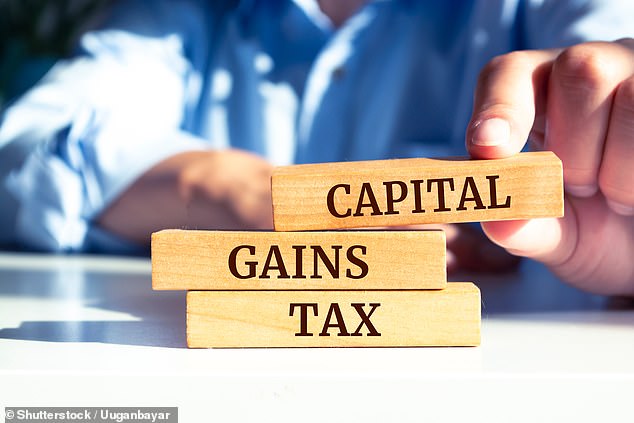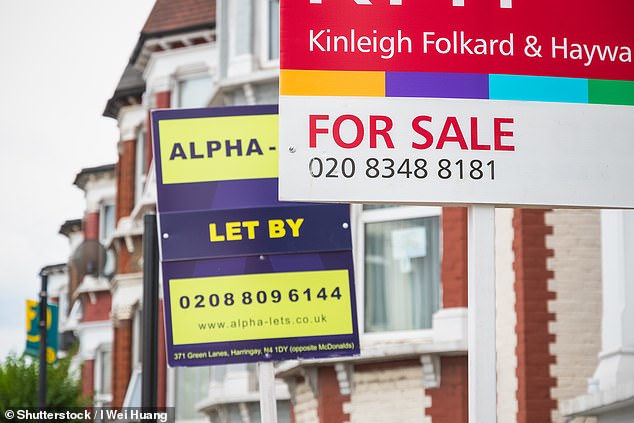Britons could face a large tax bill if they opt to keep a former home as an investment.
Some people, particularly those moving in with a partner or spouse, decide to keep a property rather than selling it when they move – becoming an ‘accidental landlord’.
While it can seem like a good investment given the prospect of rental income and potential house price growth, it could inadvertently end up costing people when they do eventually come to sell in the future.
This is because those who sell their main home, rather than letting it, are entitled to full Private Residence Relief (PRR), which will shield them from capital gains tax (CGT).
But once they let out their property, they forfeit their right to full PRR when they sell.

Tax trap: capital gains tax is currently charged at 18% for basic rate taxpayers, and 24% for higher rate taxpayers
‘PRR is essentially your protection against capital gains tax, and while you’re living in your home as your main residence, any increase in its value is completely tax-free when you sell,’ says Eamon Shahir, founder of self-assessment platform Taxd.
‘Here’s the crucial difference: if you sell your home while it is still your main residence, you don’t pay capital gains tax no matter how much it has increased in value.
‘However, if you decide to start renting to tenants, you don’t immediately lose all that tax protection.
‘His Majesty’s Revenue and Customs apportions the gain based on how long you lived there versus how long you rented it out.’
What it could mean for you
On residential property, capital gains tax is currently charged at 18 per cent for basic rate taxpayers, and 24 per cent for higher rate taxpayers – but with any significant gain, people are likely to pay most of it at the higher rate.
This is because a capital gain is added to a person’s normal income to decide the tax rate.
‘A lot of homeowners think their main home is always tax-free,’ said Andy Wood, international advisor at Tax Natives. ‘And it is, until you move out and rent it.
‘That can mean a sizeable CGT bill, sometimes tens of thousands of pounds, which often comes as a nasty surprise if you weren’t expecting it.’
Plenty of people choose to rent their homes out for a while, rather than sell, according to Wood.
‘Maybe they’ve moved in with a partner, taken a job elsewhere, or just don’t think it’s the right time to sell,’ he adds.
‘It often feels like a short-term, low-risk choice. But once you move out, the tax position shifts.
‘You start losing the relief you get for living there, and the longer it’s rented, the more of the gain becomes taxable.’

Andy Wood, international advisor at Tax Natives
Can capital gains tax wipe out rental profit?
Ask a buy-to-let investor what has made them more money over past decades: rent or house price growth? The answer will invariably be house prices.
Take a city like Manchester for example. Property prices there have almost doubled over the past 10 years, rising from £131,000 in May 2015 to £257,000 in May this year, according Land Registry figures.
This means the average property in Manchester has risen in value by £12,600 a year on average over the past decade.
Meanwhile average rents, which were £815 a month in the city in 2015 are now £1,143 per month, according to Zoopla’s data.
This means the average property has gone from making £9,780 a year to £13,716 a year in rent – but that’s before tax, letting agent fees and any upkeep costs.
Capital gains tax can be charged on any profit made on an asset that has increased in value, when someone comes to sell.
It is the gain that is taxed, not the total amount of money they receive.
For example, someone who doubles their house price from £131,000 to £257,000 will pay 24 per cent CGT on the £126,000 gain, though there is a £3,000 tax free annual allowance.

To let or to sell: While it can seem like a good idea to hold onto a home for those who can afford not to sell, it can come back to bite them when they eventually do
While the CGT bill is unlikely to wipe out all rental profits, there are situations where it might – particularly if house prices suddenly take off in an area.
For example, someone who purchased in London in the aftermath of the 2008 crash, but moved in with a partner and kept their home to rent may have found themselves in this predicament.
Between May 2009 and May and May 2016, average London prices rose from £321,000 to £627,000. That’s a £306,000 gain over a seven-year period averaging out at £43,715 a year.
Someone in this situation selling in May 2016 would have faced a 28 per cent CGT bill at that time, albeit with a £11,100 annual allowance.
That means in such a scenario they would have potentially incurred a £82,572 CGT bill on the sale.
‘This catches more people out than you might think,’ says Andy Wood of Tax Natives. ‘If your rental income’s been fairly low, but the property’s gone up in value, you could still face a large CGT bill when you sell.
‘We’ve seen cases where landlords earned £3,000 a year in rent but paid £30,000 or more in tax when they sold. That’s enough to wipe out all the rental gains – and then some.
‘Lettings relief used to help with this, but it was heavily cut back in 2020. Now, most of the gain will be taxed at 18 per cent or 24 per cent, depending on your income.
‘That’s a big hit for something that might have started off as a more of a stopgap solution.’
However, it’s worth pointing out that when someone moves out of their main home, they won’t forfeit all their CGT relief.
They will lose it for the years the property is let out, so when they sell they’ll need to work out the proportion of time they lived in the home compared to the years it was let out.
PRR also applies in full for the last nine months of ownership, whether or not someone lives at the property – provided the property was their main residence at some point.
For example, if someone bought a property in 2010 and sold it in 2025, that’s 15 years or 180 months in total.
If they lived there for 10 years (120 months), they’d get PRR relief for 129 months (the 120 they lived there plus nine bonus months). That means 71 per cent of any gain would be completely tax-free.
If they decided not to sell the property and rent it out, then only the remaining 29 per cent of the gain, representing the rental period, would be subject to capital gains tax.

Eamon Shahir, founder of the online accountancy service Taxd
Can it still make sense to let out your previous home?
Ultimately, avoiding a potential CGT bill should not be the main reason for making a decision about whether to keep a property, rather than selling it.
If someone could benefit from the rental income and feel the home will increase in value in the future, then there is arguably a strong reason to keep it as an investment.
‘CGT is not necessarily a deal-breaker,’ says Shahir of Taxd. ‘It really depends on each person’s specific situation, and once you understand how CGT works, keeping a property as a rental can still make perfect financial sense.
‘And, with CGT, you’re only ever taxed on the gain in the property’s value, so you’re never actually worse off for having owned it.
‘The question is whether the rental income plus remaining capital growth makes it worthwhile.
He adds: ‘It often works well to let your property if you expect continued property price growth, rental yield after tax looks attractive, or you bought the property years ago and have already banked significant tax-free gains having lived there.
‘On the other hand, it might not work if your property has already seen most of its gains and values are now stagnant or rental yields are poor.’
There are also certain rule quirks that will benefit some people more than others, according to Shahir.
‘Expats have a major advantage as CGT is only calculated on gains since 2015, which can make huge savings,’ he says. ‘And, if you move abroad for work, and then come back to live in your property – you will still qualify for PRR.
‘For most people it depends on the long term goal. Holding the property and letting it out can be good as additional rental income, and potential CGT or PRR relief is available. Each individual should analyse, evaluate or seek tax support.’












